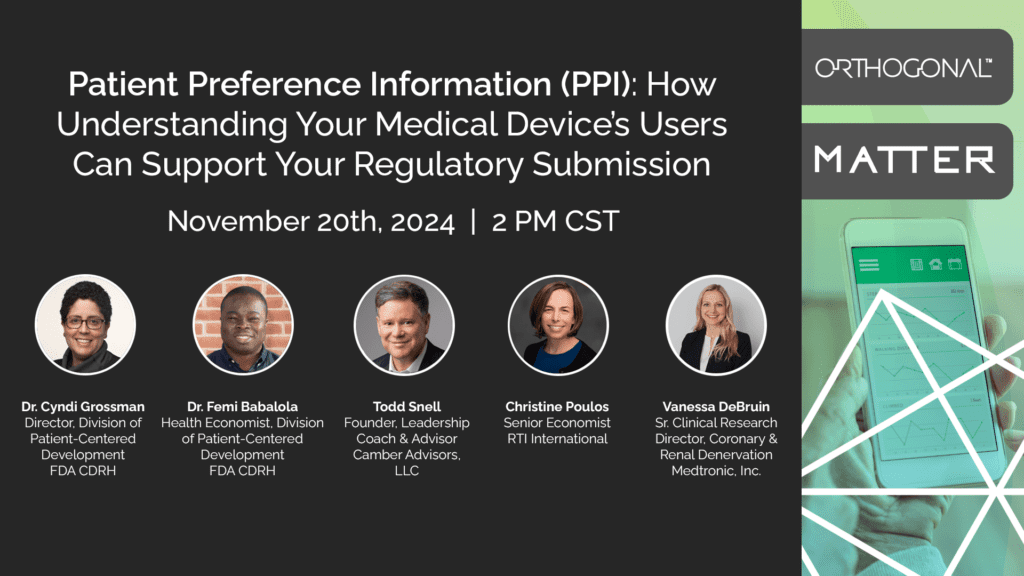
Talk
Agile & Iterative Methodologies (Fast Feedback Loops)

In today’s design-centered world, the most successful products are those designed with a deep understanding of their users’ lives. While MedTech has employed human factors to help design safe devices for our intended users, there’s more we could do to capture our user’s interest so that they receive the maximum clinical value of our medical devices.
Supporting the shift towards patient-centered design, the U.S. Food and Drug Administration (FDA) is actively encouraging medical device manufacturers to gather Patient Preference Information (PPI). PPI provides manufacturers with valuable data on the desires and limitations of their target patient audience. Additionally, the FDA has made it clear that, while voluntary, this information can influence regulatory decisions such as a medical device’s labeled indications for use. Put together, PPI could help manufacturers build a more clinically and commercially successful device.
Orthogonal and MATTER Chicago hosted a webinar on November 20th, 2024 at 2 PM CDT discussing PPI with Dr. Cynthia Grossman, who is leading the effort at the FDA in her role as Director, Division of Patient-Centered Development of the Center for Devices and Radiological Health (CDRH). She was joined by Olufemi Babalola, Health Economist, Division of Patient-Centered Development of the CDRH, who has been instrumental in advancing the FDA’s work on PPI, Todd Snell, Founder, Leadership Coach and Advisor at Camber Advisors, LLC, Christine Poulos, Senior Economist at RTI International and Vanessa DeBruin, Sr. Clinical Research Director, Coronary and Renal Denervation at Medtronic.
PPI is a systematic approach to integrating patients’ voices into medical device development and regulatory processes. It involves quantitative and qualitative assessments of patients’ preferences regarding different treatment options, outcomes, and attributes.
Key Points:
Case Study 1: Ear Tube Delivery System for Children
Case Study 2: Renal Denervation for Hypertension
Case Study 3: Solo Home Hemodialysis
Resource Constraints:
Strategies:
Methodological Complexity:
Processes:
Regulatory Uncertainty:
Clarifications:
The webinar highlighted that while PPI adoption is growing, there is significant potential for broader utilization, particularly in:
Advancements Needed:
The integration of Patient Preference Information represents a paradigm shift toward patient-centered healthcare in the medical device industry. By systematically incorporating patients’ voices into device development and regulatory decisions, manufacturers can create products that align more closely with patient needs and improve health outcomes.
Future Directions:
– – – –
Cynthia (Cyndi) Grossman, Ph.D., Director, Division of Patient-Centered Development, FDA
Dr. Cyndi Grossman is Division Director for Patient-Centered Development (DPCD) at the Center for Devices and Radiological Health (CDRH) at FDA. Cyndi came to FDA most recently from Industry, having also worked at NIH and in non-profit health policy. She is a social and behavioral scientist by training, and the throughline of her career has been leading efforts to bring the lived experience of patients, caregivers, and communities into medical product development and implementation. She has a doctoral degree in Clinical Psychology from the University of Vermont and completed post-doctoral training at Brown University.
Olufemi Babalola, MSc., MHS., PhD., Health Economist, Division of Patient-Centered Development (DPCD), FDA
Olufemi (Femi) Babalola, PhD is a health economist focusing on stated preference methods applied within a health care context. Specifically, how stated preference methods can advance regulatory science to inform benefit risk evaluations, clinical trial design and inform ordering of patient priorities. Dr. Babalola has worked at the FDA since 2016, and currently works in the Division of Patient-Centered Development (DCPD, formerly Patient Science and Engagement) within FDA’s Center for Devices and Radiological Health. Femi completed his Doctoral program in Health Economics at Thomas Jefferson University. He earlier received a Masters in Health Economics and Economics & Financial Economics respectively from John Hopkins University and the University of Nottingham, England.
Todd Snell, Founder, Leadership Coach and Advisor, Camber Advisors, LLC
Todd is an experienced leader, regulatory affairs and risk executive, strategic consultant, and coach who works with medical technology leaders and teams to improve performance and results. Prior to coaching and consulting, Todd was a Senior Vice President, Quality Assurance, Regulatory and Clinical Affairs at Fresenius Medical Care, Inc. (formerly NxStage Medical, Inc.), the world’s leading provider of products and services for individuals with renal diseases. Prior to Fresenius, Todd served in executive roles across Covidien, Genzyme, and General Electric Healthcare overseeing quality assurance, regulatory affairs and compliance for renal disease systems, parenteral fluids, vascular care products, rare disease treatments, genetic testing, and other therapeutic areas.
Todd received his BS in Systems Engineering from the United States Military Academy (West Point, NY) and his MBA in Operations Management from University of Colorado (Colorado Springs). Todd holds a current Regulatory Affairs Certification (RAC) and an Associate Certified Coach (ACC) certification from the International Coaching Federation.
Christine Poulos, Senior Economist, RTI International
Dr. Poulos is Senior Economist and Vice President of Health Preference Assessment at RTI HS. She has more than 25 years of academic, consulting, and government experience in stated preference research in health and environmental economics applications. She is an expert in the design of stated preference surveys and applying stated preference methods to measure the benefit-risk preferences of patients and other health care decision-makers. Her most recent work has applied these studies to support regulatory benefit-risk assessment of devices and biologics by the Food and Drug Administration, ACIP’s Evidence to Recommendation framework, structured benefit-risk assessment, and decision making throughout the clinical product development cycle for renal denervation, vaccines (including vaccines against influenza, coronavirus-19, tick-borne encephalitis, pneumococcal), severe emphysema, Alzheimers’ disease, multiple sclerosis, endometriosis, and diabetes, among others.
Vanessa DeBruin, Sr. Clinical Research Director, Coronary and Renal Denervation, Medtronic
With over 20 years of experience in the medical device industry, Vanessa DeBruin is a seasoned expert in clinical strategy from start-up to evidence generation. Holding a Master’s degree in Cellular and Integrative Physiology, she has a deep understanding of the scientific and clinical aspects of medical device development.
Vanessa has led and contributed to numerous global clinical trials across a wide range of therapeutic areas, including renal denervation, coronary artery disease, heart failure, neurostimulation, and arrhythmia management. She has extensive experience designing and executing complex clinical trial strategies, including innovative methods for patient recruitment. She has played a pivotal role in FDA Advisory Committee panel track trials and in developing evidence packages for regulatory submissions.
A key area of her recent work includes conducting a patient preference study for a renal denervation product, providing critical insights to support its FDA submission.
Randy Horton, Chief Solutions Officer, Orthogonal
Randy Horton is Chief Solutions Officer at Orthogonal, a software consulting firm that improves patient outcomes faster by helping MedTech firms accelerate their development pipelines for Software as a Medical Device (SaMD), digital therapeutics (DTx) and connected medical device systems. Orthogonal makes that acceleration happen by fusing modern software engineering and product management tools and techniques (e.g., Agile, Lean Startup, User-Centered Design and Systems Thinking) with the regulated focus on device safety and effectiveness that is at the heart of MedTech.
Horton serves as Co-Chair for AAMI’s Cloud Computing Working Group, as well as AAMI CR:510(2021) and the in-process Technical Information Report #115, all of which address how to safely move medical device computing functions into the cloud. He is a frequent speaker at conferences and webinars, including events hosted by AdvaMed, AAMI, HLTH, RAPS and the Human Factors and Ergonomics Society (HFES).
Related Posts

Talk
Agile & Iterative Methodologies (Fast Feedback Loops)

Talk
The Value of Digital Ecosystems and How You Build Them

Talk
Lessons Learned from 2025, Plans for 2026 for Digital

Talk
SaMD Development and the Use of AI Tooling